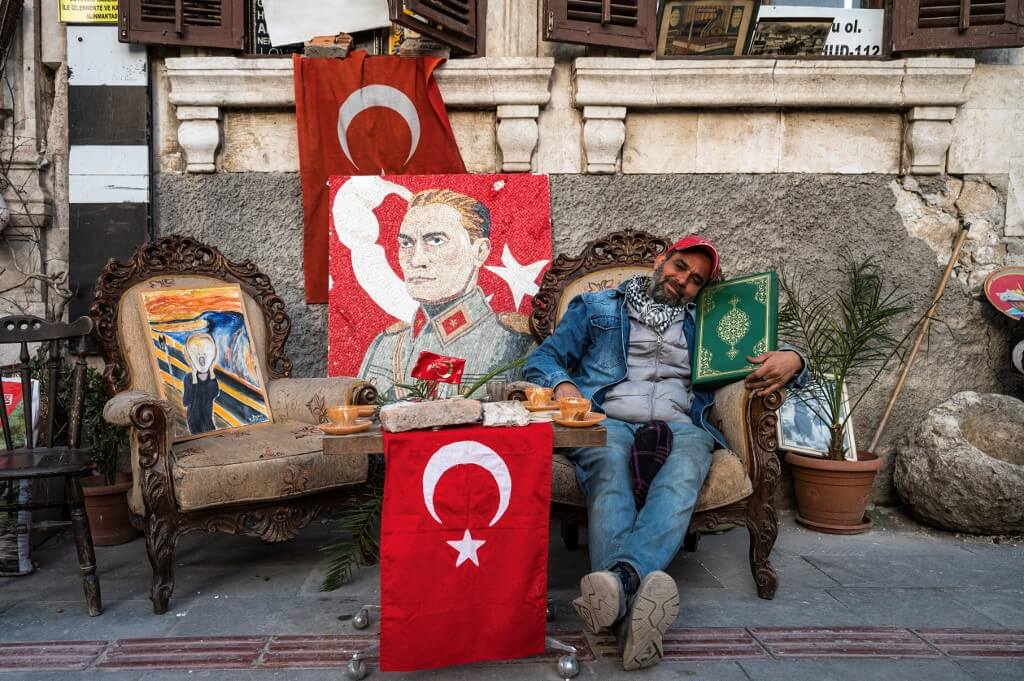The sounds of music waft in from the antique shop, where Turkish flags defiantly hang, bringing hope to the earthquake-ravaged city of Antakya as it mourns its dead.
The fabled city, historically known as Antioch, and tucked between the Mediterranean Sea and Turkey’s border with Syria, bore the brunt of a 7.8-magnitude earthquake on February 6 and a subsequent 7.5 magnitude temblor that killed more than 50,000 people.
The domes of its mosques and churches lie in pieces across the ghostly city, which straddles one of the world’s most active fault lines and has risen like a phoenix from similar disasters over the centuries.
If it does so again, it will be in no small part thanks to persevering residents such as Serkan Sincan.
Sitting in one of two upholstered armchairs he set up on the pavement next to a coffee table, the 51-year-old embodies Turkish resilience in the face of the country’s worst natural disaster of modern times.
When the ground began to shake at 4:17 a.m., Sincan managed to get his mother and father out of their flat, move them in a safer city nearby and then help neighbors out of their houses.
“On the third day, I came here and unfolded the big flag first,” Sincan told AFP.
“It was raining. I saw a friend on the way, he said ‘Serkan, your antique shop is down.’ I said ‘OK, I will see’. As I was walking, I saw the Ulu Mosque had crumbled, the protestant church was down, everything was down,” he recalled.
“Then I saw my building.”
‘Prayers stopped’
It was still standing, suffering only a few cracks in its walls. Some of the shop’s plates broke and some of the books scattered across the floor.
“But the house was still standing, and I said to myself: Allahu akbar’ [God is the greatest].”
Sincan, who quit his job at the municipality almost five years ago because he “didn’t like the system,” describes himself as an “Islamic socialist.”
Upset that daily calls to prayer issued by muezzins fell silent after the earthquake, he began walking the apocalyptic streets and singing them himself.
“Prayers stopped in Antakya. The muezzins ran away, they left the house of God,” he said.
“I am sleeping in this building. I am making the call to prayer. People say I am crazy.”
Clearly, not everyone does.
Last week, workers rigged up an emergency power line to his shop so that he could play his music — everything from opera and Turkish ballads to old Pink Floyd songs.
‘Gave me hope’
“This is our routine. In the past, my customers knew that I played cassettes and records. This is how my shop works,” he said.
Now, after clearing his street and setting up his lounge chairs, he serves coffee and treats to whomever stops by his shop — mostly volunteers, municipal workers and charity organizers who flocked to Antakya after the quake.
Özge Eser, a teacher whose building collapsed, said the sight of Sincan’s open shop made her happy.
“I came here a day before the quake. I bought a child development book and a law book for my brother, who is a lawyer,” she said.
“I was very happy to see it’s open. It really gave me hope at a time when I had lost hope.”
The portrait of Turkey’s founder Mustafa Kemal Atatürk hangs on the shop’s front wall.
Atatürk wanted the city’s Hatay province to become part of Turkey after the country’s post-Ottoman war of independence 100 years ago.
The province was fully annexed in 1939, a year after Atatürk’s death, with the last vestiges of its French mandate authorities leaving.
Echoing President Recep Tayyip Erdoğan’s pledge to rebuild the entire earthquake region within a year, Sincan sounded certain that Antakya would soon return to its former glory.”One or one-and-a-half years from now, the old Antakya will be much nicer and much better,” he said.
© Agence France-Presse


